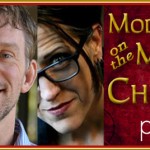This post is part of the “Modern Magi on the Mysteries of Christmas,” featuring myself, Scot McKnight, Kyle Roberts, and Billy Kangas, and is a response to Kyle Robert’s post about the Virgin Birth. It is also written in a single draft and without much thought so – kind of jumbled.
In his post about the miracle of the Virgin Birth, Kyle Roberts expertly sums up the arguments offered by Moltmann and Barth both for and against believing that Mary, Mother of Jesus, conceived our Savior by the power of the Holy Spirit and not by “knowing her husband” in, quite literally, the “biblical sense”:
To sum up, for Moltmann, the infancy narrative is a legend with great theological meaning, whereas the virgin birth itself is a dispensable miracle account whose significance has nothing to do with biological mechanisms of reproduction. It offers, in itself, no key to the theology of Jesus, but is an interposition from later, post-resurrection, understandings of Jesus’ divine person. As he puts it, “The confession of faith in Jesus, the Son of God, the Lord, is independent of the virgin birth, and is not based on it.” For Moltmann, the infancy narrative tells us about the Spirit and Jesus in fellowship with the Father bringing salvation to the world. For Barth, on the other hand, the virgin birth is an indispensable miracle of God’s free grace, a miracle which ensures that the beginning of Christ’s story matches its ending–supernatural intervention, divine initiative, salvation.
Barth did note, however, that the virgin birth is not an element of belief required for having faith. For Barth, God’s gift of grace in salvation is not contingent on ‘orthodox’ theological beliefs.
Kyle goes on to ask: what about us? What do we believe when it comes to the *Virgin Birth?
Great question. I happen to agree with Moltmann and Barth that affirming the medical accuracy of the Virgin Birth is not an element of belief required for having faith. I also understand why believing in the Virgin Birth can seem like believing in a fairy tale and not anything anyone would believe who actually uses human reason and listens to the requisite hours of NPR. Yeah, it’s kind of nuts.
Yes, belief in the Virgin Birth is not compulsory for having faith, but it is part of our confession of faith. “I believe in Jesus Christ, God’s only son, our Lord who was conceived by the power of the Holy Spirit and born of the virgin Mary.”
In these debates about what you as an individual HAVE to believe – what you have to intellectually assent to in order to be really Christian, I wonder if we have lost what it means to just simply confess our faith as the church. We spend so much time apologizing for our faith, defending our faith, or proving our faith that we forget that this whole Christianity thing started by regular people just confessing their faith (dismissed by some as the idle tales of women), a faith that yes, seems preposterous to those who do not believe.
See, confession is a different order of discourse than proving. It allows us to place ourselves in the stream of the faithful, a stream that has flowed long since we stepped in it and will flow long after we have gone. Confession of faith is what we do in the Sanctus during the Eucharist – when we join the chorus of praise that sings through eternity – when we join with angels and arch angels and all the broken saints and redeemed sinners around the throne of God who sing Holy, Holy, Holy Lord God of Power and Might. Heaven and Earth are full of your Glory, Hosannah in the Highest, Blessed is the One who comes in the name of the Lord.
In joining the church in a confession of faith – whether in the Sanctus or in the Creed – we say, this is our story. And to say something is our story is a powerful, life-shaping thing. But it is not YOUR story. It is not YOUR creed. It is the CHURCH’S story, the CHURCH’S creed and you and I are a small part of the church.
If you do not intellectually assent to the idea that Jesus’ mom was a virgin, it’s ok. I will believe it for you. Sometimes that’s what it means to be the church. We carry this faith on each other’s behalf. Some days you might have to believe it for me.
And I know it’s weird and naive and perhaps simple minded for an educated person to say this, but I confess: I believe in Jesus Christ our Lord who was conceived by the power of the Holy Spirit and born of the virgin Mary.
Wait, Nadia, are you saying it is a FACT that Jesus was born of a virgin?
Is it a fact? That feels hard to know or prove. But is it TRUE? Yes, it is absolutely true. It’s true in the way that the physical resurrection of Jesus is true. So yeah, I don’t get my Christology from the Historical Jesus scholarship, but I do get my faith from the holy catholic and apostolic church of which I am a small, small part. And the preposterous physicality of that faith matters to me. It matters because I believe the Christian story unites things human and divine in surprising, can’t-scientifically-account-for-them kind of ways. So I’m raising my hand. I confess my faith in the virgin birth.
———————————————————————
*I get that for centuries Mary has been adored for being “good” – the docile picture of purity and virginity. As a matter of fact, some believe that unlike other women, Mary was born without sin. Which, of course, implies that God could never choose to make God’s home in the womb of an actual woman, since we know that actual women are sinful, fleshy, temptresses. So Mary had to have been a special one-off kind of woman who was really, really different than all the other women out there. And so it was her really, really differentness from actual women that earned her God’s favor. This feels like woman-hating nonsense (the theological bread and butter of so much Christian theology over the last 2,000 years).
(I have written a chapter in my upcoming book that details my devotion to Mary, which runs deep.)

![Giovanni dal Ponte [Public domain], via Wikimedia Commons](https://wp-media.patheos.com/blogs/sites/20/2014/12/372px-Giovanni_Dal_Ponte_-_Virgin_and_Child_with_Angels_-_WGA09442.jpg)










